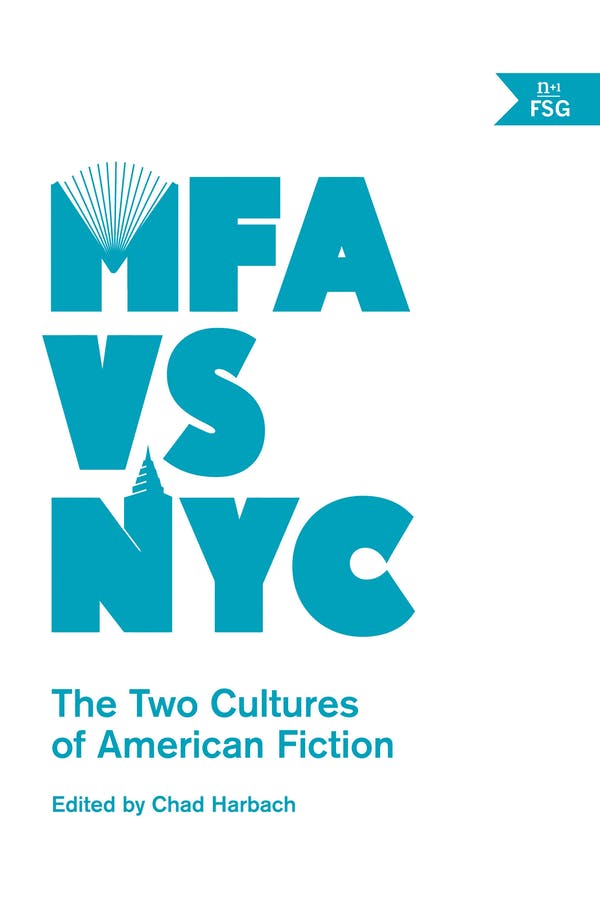MFA vs. NYC

There was a lot of tittering about this anthology of essays this winter. Opinions were raised in a variety of newspapers, literary blogs and magazines. The gist of the book is, there are two ways to make a living as a writer in America: 1) by getting an MFA, probably going into debt, and then hoping to get a position as a creative writing professor, or 2) by living in or near the heart of the American publishing industry, schmoozing with agents, editors, and publicists, hoping to get a book published and to have it be popular enough to sell for an advance that you hope will pay the rent.
I saw the book — and the debate — cross my Facebook page a few times, but I resisted reading any of the buzz. When asked my opinion about the topic, I often shrugged. I'm in Canada, I'd say. This doesn't affect me. But while it's true that Canadians might have a different perspective on the MFA/NYC binary, it's disingenuous to claim that what happens in the American literary landscape doesn't affect us. It does.
My dear friend Frances finally pressed the book into my hands and told me that I really needed to join the discussion.
The dilemma the book describes: In 2014, how can a writer live a creatively gratifying and financially solvent life? Can a writer avoid going into debt? Can a writer study writing without the damaging effects of comparison and competition? Can a writer get published without moving to NYC and schmoozing it up at all the publishing parties?
I warn you: this book is depressing. The answers are unsatisfactory on both sides of the debate.
I felt some of the effects of this dilemma when I graduated from my MFA program. I wrote about that here.
My escape hatch? In 2011, I made my own creative writing program.
I have strong opinions about creative writing practice and creative writing pedagogy. I care about what it really means to be a good writer. I don't think writers should live in debt and feel broke all the time. For me, the writing process is so enchanted, so fundamental to my mental and emotional well-being, and such a primary way for me to feel love and faith on a daily basis, it feels like a spiritual connection. Writing is important. It is non-negotiable. And I adore the process.
I'm going to bring in some of my trusted friends and colleagues to weigh in on this with me.
Alan Watt: All writing is connected to the need to evolve.
Sherwood Anderson: The point of being an artist is that you may live. You won't arrive. It is an endless search.
Cheryl Strayed: I know it's not easy being an artist. I know the gulf between creation and commerce is so tremendously wide that it's sometimes impossible not to feel annihilated by it. A lot of artists give up because it's just too damn hard to go on making art in a culture that by and large does not support its artists. But the people who don't give up are the people who find a way to believe in abundance rather than scarcity. They've taken into their hearts the idea that there is enough for all of us, that success will manifest itself in different ways for different sorts of artists, that keeping the faith is more important than cashing the check, that being genuinely happy for someone else who got something you hope to get makes you genuinely happy too.
Rainer Maria Rilke: Works of art are of an infinite solitude, and no means of approach is so useless as criticism. Only love can touch and hold them and be fair to them.
Anne Truitt: The most demanding part of living a lifetime as an artist is the strict discipline of forcing oneself to work steadfastly along the nerve of one's own most intimate sensitivity.
I share a philosophy with these writers and thinkers. That is why I made The Story Course, and why I run The Story Intensive once a year. I care about writing, and I care about writers. My writing programs are a way out of the MFA/NYC debate.
Here's what I think:
If we take care of our writers and teach writing in a compassionate way, we'll have way more interesting books to read. And more inspired things will happen to the way we read and write! It's 2014: everything in publishing is in flux. I want to make a safe place for writers to really engage with their writing, to learn and to connect without fear of failure. Or insolvency! Artists shouldn't be gouged by such a hefty tuition that they have to carry debt to afford it. I also want to connect new writers to established writers without triggering insecurities, egos and competition.
When I'm writing, I'm working with uncertainty every day, and this pushes me to my limits. I learn more about myself and the human condition the more I write, but it's not easy. It's exhilarating and scary and beautiful. The feeling of being a successful writer only comes when I'm in the midst of that process. It didn't come from my MFA. It didn't come from publishing my first book.
Every writer is in a deep and intimate relationship with his or her own creative process. Showing up to write is meaningful and real and full of risk: if anything new is going to be written, there must be space for surrender and curiosity.
The binary posed by the MFA vs. NYC anthology doesn't leave a lot of space for that. But take heart! The binary isn't true.
There are more than two rivers that lead to writing and publishing.
The Story Intensive is one alternative tributary.
After reading MFA vs. NYC, I had a case of the thick and gooey doldrums. Ugh. You know what brought me back? Reading the letters and comments that my Intensive teachers wrote about why they were excited to teach the program this fall. I spent an afternoon reading their letters and crying. I was so relieved by their generous words: their joy and intelligence, the beautiful community they create, and their profound respect for the mystery of the creative process. Reading my teacher's letters felt like coming home. These writers inspire me so much: and they remind me that the writing life does not have to be suffused by scarcity, jealousy and fear.
I want to excerpt their beautiful thoughts on writing and teaching with you, too, but this post has already gone on long enough! I'm putting a letter together to share about my teachers, so anyone who is interested in the Intensive can see the calibre of the people leading the workshops.
If you've been considering an MFA, I invite you to consider The Story Intensive as another option. This program happens every fall.
There's a reason I've chosen these people to facilitate my writing program: they care about writing and care about writers. They believe there is enough for all of us. They believe that only love can touch art and be fair to it, that living a creative life is an endless search, and that all writing is connected to the need to evolve.
xo,

ps. Please share this post widely with writers you know. And join the discussion: how/why did you study creative writing? What fiction "culture" do you live in?


23 comments
Leave a comment